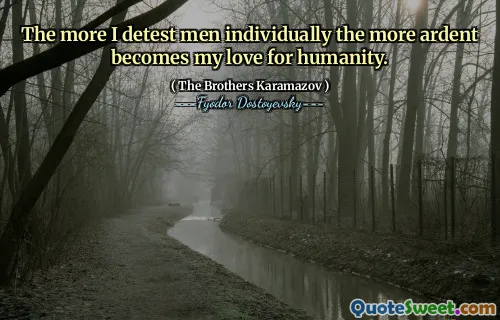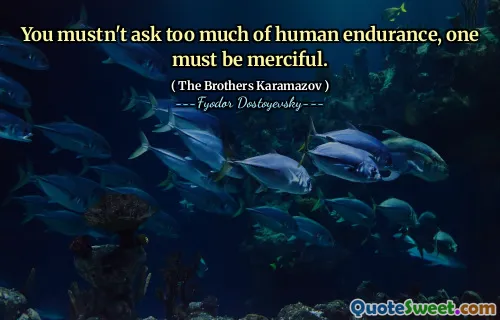"The Brothers Karamazov," a philosophical novel by Fyodor Dostoevsky, explores profound themes through the lives of the Karamazov brothers: Dmitri, Ivan, and Alyosha. Each brother represents different aspects of the human experience and moral inquiry—Dmitri struggles with passion and conflict, Ivan embodies intellectual skepticism, while Alyosha reflects faith and compassion. The interplay between their characters delves into the complexities of belief, ethics, and the existence of God.
The central narrative revolves around the tumultuous relationship within the Karamazov family, particularly their father, Fyodor Pavlovich. His immoral behavior and the contention over inheritance ignite a series of events that lead to existential questions about justice and morality. The plot thickens with Dmitri facing accusations of parricide, prompting intense debates about free will and guilt among the brothers.
Dostoevsky's work is rich with religious and philosophical dialogue, inviting readers to reflect on the nature of faith and doubt. The novel captures the struggle of human souls seeking truth in a world rife with suffering. Ultimately, "The Brothers Karamazov" stands as a monumental exploration of human conscience, making it a cornerstone of literary and philosophical discourse. Its timeless questions about morality and existence remain relevant, inviting ongoing reflection and discussion.
More »
Today Birthdays
1729 -
Edmund Burke
1949 -
Haruki Murakami
1954 -
Howard Stern
1876 -
Jack London
1993 -
Zayn Malik
1951 -
Kirstie Alley
1863 -
Swami Vivekananda
1923 -
Alice Miller
1987 -
Naya Rivera
1825 -
Brooke Foss Westcott
1944 -
Joe Frazier
1951 -
Rush Limbaugh
1964 -
Jeff Bezos
1978 -
Jeremy Camp
1628 -
Charles Perrault
1856 -
John Singer Sargent
1970 -
Kaja Foglio
1953 -
Rick Santelli
1986 -
Gemma Arterton
1968 -
Raf Simons
1958 -
Christiane Amanpour
1966 -
Olivier Martinez
1996 -
Ella Henderson
1917 -
Maharishi Mahesh Yogi
1949 -
Ottmar Hitzfeld
1928 -
Ruth Brown
1968 -
Heather Mills
1946 -
George Duke
1968 -
Rachael Harris
1923 -
Ira Hayes










